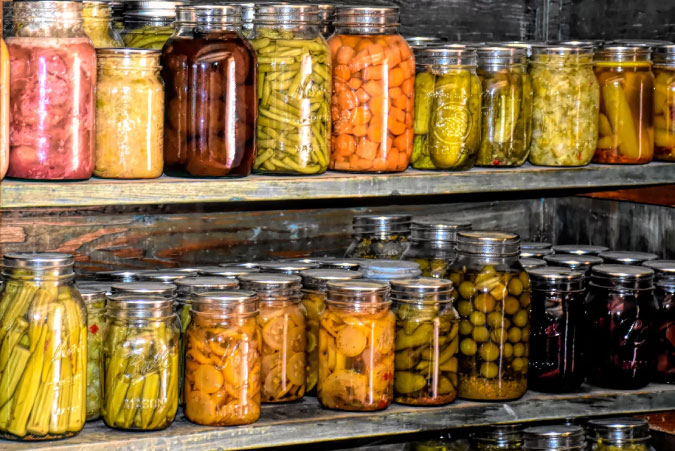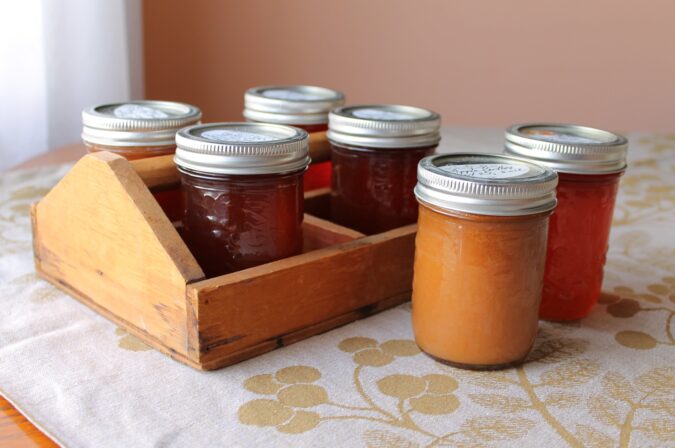Are you afraid of pressure canning? What if the thing blows up? What if I don’t do it right? The doubt and fear can be endless.
They are quite intimidating with all those latches, that ominous gauge, and that hissing steam vent. But, fear not! There are people out there to help you learn to safely and confidently use the pressure canner!
Pressure canning is simply another method of preserving food that has been around for centuries. It’s a skill that can be incredibly useful for those engaged in homesteading, providing them with a sustainable method to store and consume their home-grown produce.
The Process of Pressure Canning
Being able to preserve food is an extremely useful skill. And a joy! Every day, I get a little jolt of happiness at the sight of my pantry lined with jars of homegrown food.
It’s also a big part of my backup food store. Not only for backup food but also the plan ‘in case the freezer goes out.’ I remember seeing a news segment after a big storm, and the camera zoomed in on big hunks of dripping meat that were spoiling and would be wasted because the power was out. That will never happen at my homestead. I will immediately put my homesteading skills to the test and pressure canning will be first on my list! But you can be dang sure it isn’t going to be wasted.
Pressure canning involves the use of a specialized pot that can create a seal, allowing the internal temperature to rise above the regular boiling point of water. This elevated heat level kills off any bacteria, yeasts, and molds that might spoil the food, thereby preserving it for extended periods. Foods that can be preserved using a pressure canner include fruits, vegetables, meats, and seafood. The Ball Blue Book Guide to Preserving has tons of tested recipes.
Here are a few of my favorite types of pressure canners to fit all budgets and skill levels. In addition, I’ve included an electric pressure canners, which has recently been approved by the FDA for home canning.
The Benefits of Pressure Canning
One of the main reasons why pressure canning is a valuable skill for homesteaders is its role in modern self-sufficiency. This technique allows you to store the surplus from your harvest or to shop for grocery store sales. This ensures you have a steady supply of nutritious food throughout the year, even during the off-season.
Secondly, pressure canning is economical. By preserving your own food, you can save a significant amount of money compared to buying canned goods from the store.
Lastly, pressure canning gives you control over what goes into your food. You can avoid the preservatives and additives often found in commercially canned foods, leading to healthier and tastier meals. You know exactly what you are putting into your body! And if that isn't peace of mind, I don't know what is!
An Essential Homesteading Skill
Pressure canning is an essential homesteading skill that promotes self-sufficiency, saves money, and leads to healthier eating habits. By mastering this skill, homesteaders can secure a reliable and nutritious food source for themselves and their families. It's a tradition that connects us with our past and prepares us for a sustainable future.
If you have any concerns about using a pressure canner, visit Kendra from New Life on a Homestead who shows her gentle ease as she works with the equipment and will inspire you.
The information is really empowering for those who have not done any type of canning in the past. Go visit Kendra to learn more about her methods at Kendra's Pressure Canning Methods
and be sure to tell her Marjory Wildcraft sent you!
Additional Resources From The Grow Network
3 More Ways to Preserve Food for Long-Term Storage
How to Create Food Security For You and Your Family
Marjory Wildcraft is the founder of The Grow Network, which is a community of people focused on modern self-sufficient living. She has been featured by National Geographic as an expert in off-grid living, she hosted the Mother Earth News Online Homesteading Summit, and she is listed in Who’s Who in America for having inspired hundreds of thousands of backyard gardens. Marjory was the focus of an article that won Reuter’s Food Sustainability Media Award, and she recently authored The Grow System: The Essential Guide to Modern Self-Sufficient Living—From Growing Food to Making Medicine.









COMMENTS(0)
Hi – I grew up canning & using a pressure cooker, so I am not afraid of it – but thought you would like to know of an unexpected experience after a flood near my home community (SE MN). Some people thought that they would at least be able to salvage their unbroken home canned foods when cleaning up after the flood – with a quick look, the jars seemed fine & the lids were still sealed. However, later, when attempting to use these foods, water & mud from the flood was discovered inside some of the jars! The jars were still sealed, so how could that be? It is only a guess, but some folks think that the tremendous pressure from the flood waters resealed the jars after the original seal was broken. Have you ever heard of such a thing?
Another thing people should know about modern day floods is that the water is so contaminated that even having it touch your skin may cause chemical burns. Modern flood waters can be a kind of toxic soup with a mixture of things swept away from local gas stations and farm chemical tanks, as well as, hazardous waste from both local factories and post consumer waste collection sites. So, we need to be aware that sometimes, the land itself may become contaminated & can no longer be used for growing food. Some of the small farmers where I live were put out of business when their land was condemned & considered unsafe.
What a shame that all of that food was spoiled, Carol! I can definitely sympathize. Though it is surprising that the jars leaked and then resealed. Guess you can never be too careful. Thanks for the warnings!
Are a pressure cooker and a pressure canner the same thing?
Hi Kerry Anne,
Great question! A typical pressure cooker cannot be used to can. However, All American makes a pressure cooker/canner, which can be used for cooking AND canning. NEVER try to can in a standard pressure cooker, it is only safe to can in a pressure CANNER. 🙂
Thank you so much, Marjory, for the kind review. What an honor to be mentioned here. 🙂